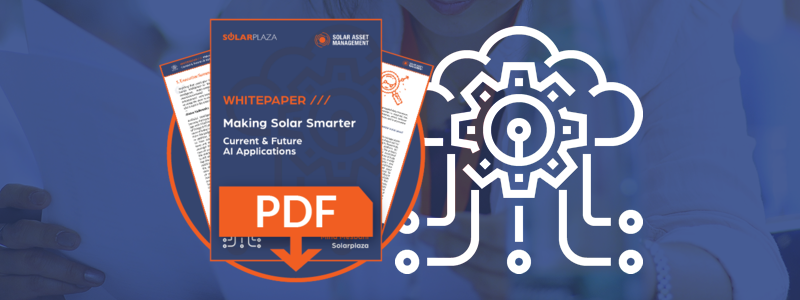White Paper
3 January 2018
Estimated reading time: 10 min
White Paper: Current & Future Artificial Intelligence Applications

The recent leaps and bounds in artificial intelligence technology and machine learning have ushered a new era driven by automation. Artificial Intelligence (AI) is defined as a branch in computer science emphasising the creation of intelligent machines and computers similar to human beings in terms of behaviour and response capabilities. These machines are autonomous in their actions and require no programming.The integration of the solar industry and artificial intelligence is still considered to be in its infancy. Suffice it to say, the synergy of these two industries can revolutionise the current power generation practices across the world. Furthermore, the Internet of Things (IoT) will play an even more pivotal role in enabling the AI transformation. How swiftly the full potential of AI will be realised for solar, is still a matter of debate. Nonetheless, AI will certainly have an immense impact on the solar business. Therefore, embracing AI powered solar technologies is not only a prudent decision but a necessary one to be able to cope with the possible disruptions of business models in the industry.
Below is an overview of the AI applications in the solar industry. For a more detailed explanation as well as a list of some of the key players and available products, you can download our complimentary whitepaper.
Some of the applications of AI in solar
- Asset management- There are a number of disadvantages to utilising spreadsheets to manage solar assets including lack of efficiency and a host of reliability issues. Cloud-based asset management and data aggregation platforms are a promising alternative and highly valuable in terms of enhancing the overall efficiency of the company.
- Weather forecasting- Ultra-accurate forecasting is extremely beneficial for reliable grid operations while maintaining low costs. In addition, smart forecasting models help the distributor and operators to adapt prior to extreme weather conditions enabling them to avert power outages.
- Failure forecasting- By means of asset modelling, real-time big data processing and sensor data analysis, it is possible to create a replica of the actual physical asset. This virtual model supplies a blueprint of a “fully-functional” plant, which can then be used as a benchmark to spot data anomalies. These insights enable the operators prevent potential future failures.
- Yield enhancement- Through AI applications, production data of power plants can be analysed and compared against algorithmic models to improve the yield.
- Grid modernisation- Continuous collection and contextualisation of data provided by million of sensors optimises the allocation of energy resources. In essence, specialised microgrids will supplant enormous regional grids, which can also be combined with advanced battery technologies allowing power to flow continually to and between local communities even in cases of extreme weather.
- Inspection- Robots, for instance flying drones, are able to conduct PV plant inspections and carry high-resolution or thermal/infrared cameras. This unearths an abundance of new data, which can be processed even in real-time by dint of AI and deep learning.
- Monitoring- In monitoring PV plants, the data is streamed continuously and usually transferred into different data stores. This can result in data fatigue in systems, particularly when dealing with a growing number of plants, which impedes operators from effectively performing their tasks. Moreover, there are substantial hardware expenses associated with storing and processing a large abundance of data. These issues can be remedied by means of an AI powered solution, which utilises data agents to centralise the data gathered from multiple SCADA systems.
Learn more about the implications and potential of AI and meet the companies applying the latest O&M technologies at the fifth annual edition of Solar Asset Management: North America, the leading platform on the operational phase of solar assets, set to take place on March 13 & 14 in San Francisco. Learn more on the website: https://solarassetmanagement.us/

Download our White Paper
